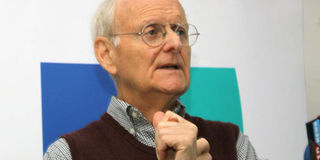Research links graft awareness to party affiliation

Ipsos Synovate Lead Researcher Tom Wolf addresses journalists during the release of an opinion poll at the firm's offices in Lavington on December 21, 2016. He has said that party ties influence perceptions on corruption. PHOTO | ANTHONY OMUYA | NATION MEDIA GROUP
What you need to know:
- Prof Wolf said the researchers followed the patterns of the 2009 population census rather than focus on party strongholds.
- The research was conducted between January 9 and 26, with 2,057 adult Kenyans contacted through face-to-face interviews.
Party affiliations and how Kenyans receive information could be influencing how they perceive corruption in the country, a study suggests.
An additional report of a survey by research firm Ipsos shows that perception of corruption in the country and the government’s determination to tackle it are being viewed differently by those supporting Jubilee and the Opposition.
The survey indicates that seven in 10 people (68 per cent) are aware of corruption cases in the country, such as the NYS, Afya House and Olympics scandals.
A similar number of Kenyans believe those implicated in corruption will be convicted.
But when the data was split between Opposition (Cord or Nasa) and Jubilee supporters, it showed that more of those opposed to the ruling party have little belief in the President’s anti-corruption programme.
Eight in 10 people who claim to support Cord said they are aware of corruption scandals while 65 per cent of the Jubilee supporters said they knew those scandals.
"Presumably, all these people live in Kenya and when you look at the analysis of trends among Cord and Jubilee supporters, there is always a 10 point gap between them," Ipsos Lead Researcher Tom Wolf told the Nation.
"But there could be reasons. I can’t prove it yet, but I suspect a significant population of Jubilee supporters know corruption is there and is bad — they may just be shy to talk about it or point it out,” he argued.
He also said that the mentioning of corruption by leaders plays a role in how the matter is approached.
"Another factor, and this is just a hypothesis, is that whenever opposition leaders go around the country, it is almost impossible that they will not mention corruption and so their supporters get to know this.
"So it might not be because of the silence of the Jubilee, but just the emphasis of the opposition. I can’t prove it and we would probably have to do another study on it," he added.
LOW BELIEVABILITY
The Ipsos release, a fifth in a series on the performance of the Jubilee government, did not ask respondents where they first get information on corruption suspects or scandals, something that would partly strengthen the link between party affiliation and corruption perception.
But it showed that six in 10 Jubilee supporters think the President is sincere with his efforts to fight corruption even when just 36 per cent of Kenyans in general think he is.
Among Cord supporters, just 15 per cent believe in his efforts while seven in 10 people do not take his word at all.
The president’s believability scale has gone down significantly over the past two years.
When respondents were asked if they believed he can slay the graft dragon in April 2015, half of Kenyans said they believed him.
In August of that year, this group thought the President is sincere in his anti-corruption campaign.
Now, just 13 per cent are certain he can and 36 per cent think he is sincere about it.
It should be noted, however, that the sample for Jubilee supporters was higher than Cord supporters.
Prof Wolf said the researchers followed the patterns of the 2009 population census rather than focus on party strongholds.
But it happens that these regions with higher population also support Jubilee.
In fact, the belief in the President’s anti-corruption programme follows his strongholds with 64 per cent in the Central region and 44 per cent in Rift Valley, areas that overwhelmingly supported him in 2013.
RELATIVES EMBROILED IN GRAFT
Here, locals think the President’s public comments against corruption, having no personal record of corruption, convening an anti-corruption summit at State House, tabling the so-called List of Shame in Parliament and firing implicated Cabinet secretaries are key reasons to believe him.
But just one per cent of these people feel cases of corruption are decreasing.
In Nyanza, which voted for Cord leader Raila Odinga, the President is believed only 13 per cent of the time, just below Coast’s 24 per cent.
Here, people feel the fact that no senior government official has been convicted, there is nothing more he can do, his allies have been implicated, including his family members, means his pronouncements cannot be believed.
The report also shows that 82 per cent of Cord supporters do not expect the corruption suspects to be convicted. Among Jubilee supporters, the number is 60 per cent.
The research was conducted between January 9 and 26, with 2,057 adult Kenyans contacted through face-to-face interviews.





